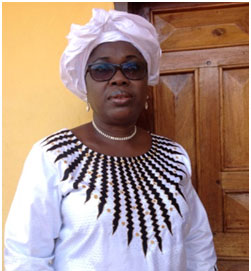by ROSE DELANEY
 Bernadette Lahai
Bernadette Lahai
Dr.Bernadette Lahai is a Sierra Leonean politician and the current Minority Leader of Parliament. She is the leader of the main opposition Sierra Leone People’s Party in the House of Parliament. She is also the Vice President of the Pan African Parliament.
IPS: In what ways has the Pan African Parliament (PAP) ensured that partners are upholding their commitments following the Parliamentary meeting held during the International Conference on Nutrition (ICN2) organized by FAO and the World Health Organization?
Dr.Lahai:PAP, as an advisory body, and their members on both national and regional levels, have continuously called for the attention of governments, international agencies, NGOs as well as individuals to fulfil their various obligations that adhere to international commitments and declarations. In order to communicate these responsibilities, expert hearings, workshops, media outreach and advocacies, lobbying and experiential exchanges have been implemented. There has also been a push for the ratification of treaties and protocols which hinder development. Lacking adequate power to slam sanctions on defaulters, PAP can only advocate and lobby for adherence to these commitments. As a result of the granting of legislative and oversight powers over the African Union, it is hoped that PAP will be calling for more accountability and transparency, with the possibility of sanctioning non-compliant governments and institutions.
IPS: In light of the multiple challenges facing the African continent, in your view, how has the PAP fared in consolidating partnerships to impact policy-makers to consider food security and malnutrition when they design and formulate policies?
Dr.Lahai: The PAP Committee on agriculture, rural economy, environment and climate change have and continue to collaborate with their counterparts in the African Union Committee, the New Partnership for African Development’s “The Comprehensive Africa Agriculture Development Programme”, national and international agricultural organizations and research institutes. NGOs are also working on food security and nutrition-related matters to exchange information on the subject, undertake joint activities and review data on progress. They also plan to make joint resolutions, declarations, and a memorandum of understanding (MOU) reminding governments and international organizations of their commitments, especially related to laws and policies to address nutritional and food security challenges. Fully aware of the fact that food security and nutrition issues are cross-cutting, PAP has also called for joint collaboration of committees and sectors whose work compliments food security and nutrition. Such sectoral coordination will help in addressing food security and nutrition in a holistic manner, which in turn, will help maximize limited resources and gains. Partnership with other institutions has also helped PAP access data, which is critical for inform decision-making, debate, advocacy, and lobbying.
Inter Press Service for more
